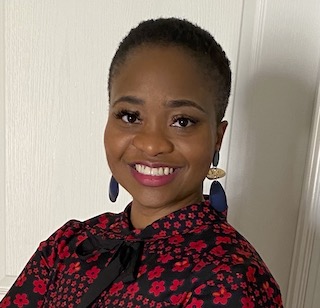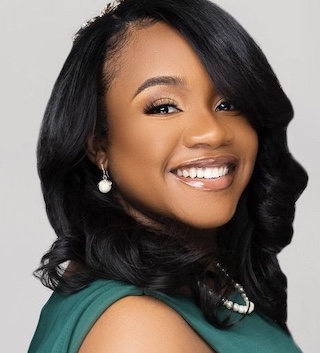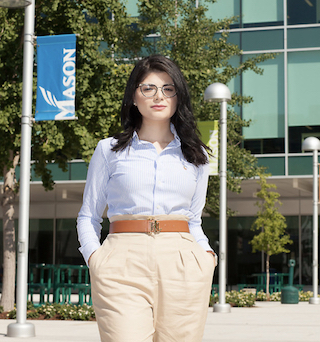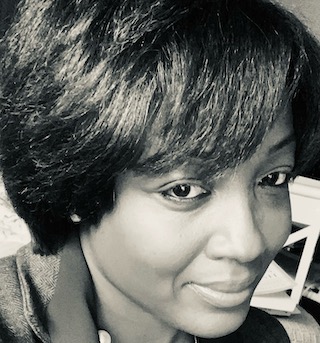Of the 115 judges who have served on the U.S. Supreme Court, 108 of them have been White men. This summer, Judge Ketanji Brown Jackson will spark a change, as she becomes the first Black woman to serve as a justice in the court’s 233-year history. She was confirmed by the Senate on April 7.
“I’m beyond thrilled that she got confirmed to serve on the Supreme Court, and I look forward to seeing the court one day becoming even more representative of what this nation looks like,” said Sally Alghazali, a third-year law student at George Mason University’s Antonin Scalia Law School.
Several students of color, including leaders of Mason’s Black Law Students Association (BLSA), said Judge Jackson’s accomplishment gives them renewed confidence that there is a place for them.
Here’s what they had to say:
Sahara Shrestha

“When you see someone so qualified, like Judge Jackson, achieve success and get the recognition she deserves, it is incredibly inspiring and encouraging,” said Shrestha, a third-year law student and first-generation Nepalese-American.
“It makes me want to dream bigger about the possibilities of where my legal career could take me and other young women of color…. I still walk into legal spaces, whether it be the classroom, courtroom, or workplace, feeling like I am the only person who looks like me or thinks like me. Judge Jackson becoming a Supreme Court justice is a step toward ensuring that the legal field, including the highest court in our nation, is representative of all of us.”
Chinyelum (Chi-Chi) Olele

Vice President of BLSA
“Seeing another Black woman reach the mountaintop of her career and shatter the glass ceiling is exciting,” said Olele, a first-year law student from Nigeria who grew up in Virginia Beach.
“Watching her navigate the hearing poised and with a smile was inspirational. Judge Jackson's confirmation is a representation of what America is. America is a country of possibilities, and as an immigrant, I know that the possibilities are endless.”
Bianca Hancock-Siggers
President of BLSA

“Judge Ketanji Brown Jackson being on track to become the first Black woman to sit on the Supreme Court is not a ‘small favor’ from heaven, this is faith with work!” said Hancock-Siggers, a third-year law student from Indianapolis, Indiana.
“I often look around my law classes and ask myself, ‘Am I supposed to be here, am I good enough?’ Judge Jackson has helped to me answer that question in the affirmative. I look at her and know, although I am underrepresented in this community, I am not lesser. I do not have to conform my views or alter my appearance to find success.
“I am looking forward to seeing the diversity in experience that Judge Ketanji Brown Jackson will bring to the Supreme Court of the United States.”
Sally Alghazali

“Judge Jackson’s confirmation gives me hope and drives more determination in me to continue in this field,” Alghazali said.
Alghazali, who moved to the United States from Baghdad, Iraq, in 2013 as a refugee, said Judge Jackson’s confirmation gives her hope and determination to continue in the legal field. She said she was struck by Judge Jackson’s anecdote about another Black woman approaching her in the hall at Harvard and telling her to persevere, and that in turn was what Jackson said she would tell other Black American youth trying to do what she did.
“As a first-gen and diverse law student, this is what her confirmation means to me: that no matter how much people doubt me for being different or not ‘fitting in,’ I can reach my goals with determination and perseverance. Judge Jackson showed me and all those who don’t fit the ‘typical’ image of an American lawyer that we, too, have a seat at the table.”
Shanessa Guidry
BLSA/Pre-Law Liaison

“A couple weeks ago, I considered quitting law school because I started to feel like I didn't belong, and when I look around, I really don't see anyone who looks like me,” said Guidry, a first-year law student from Rocky Mount, North Carolina, who spent 20 years working at U.S. Department of Defense.
“When I was thinking about quitting [law school], an African American colleague sent me the clip from Senator Cory Booker when he addressed Judge Jackson. [Booker] told her, ‘You got here how every Black woman in America who’s gotten anywhere has done. By being, like Ginger Rogers said, 'I did everything Fred Astaire did, but backwards in heels.’ He told Judge Jackson, 'You have earned this spot, you are worthy,' and 'Don’t worry, … God has got you.' I have those words in the back of my mind as I make it through my first year. Her nomination and her confirmation mean the world to me at this point, as a middle-aged woman who's choosing to pursue this degree.”
